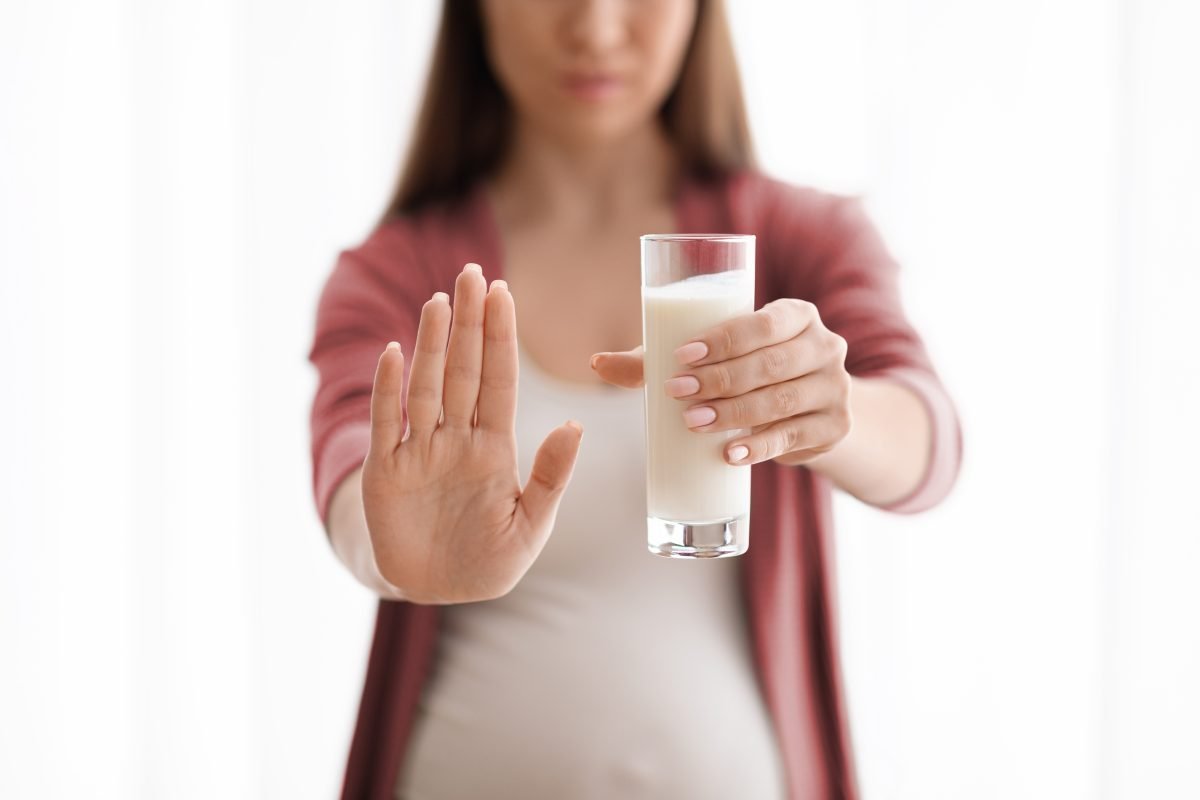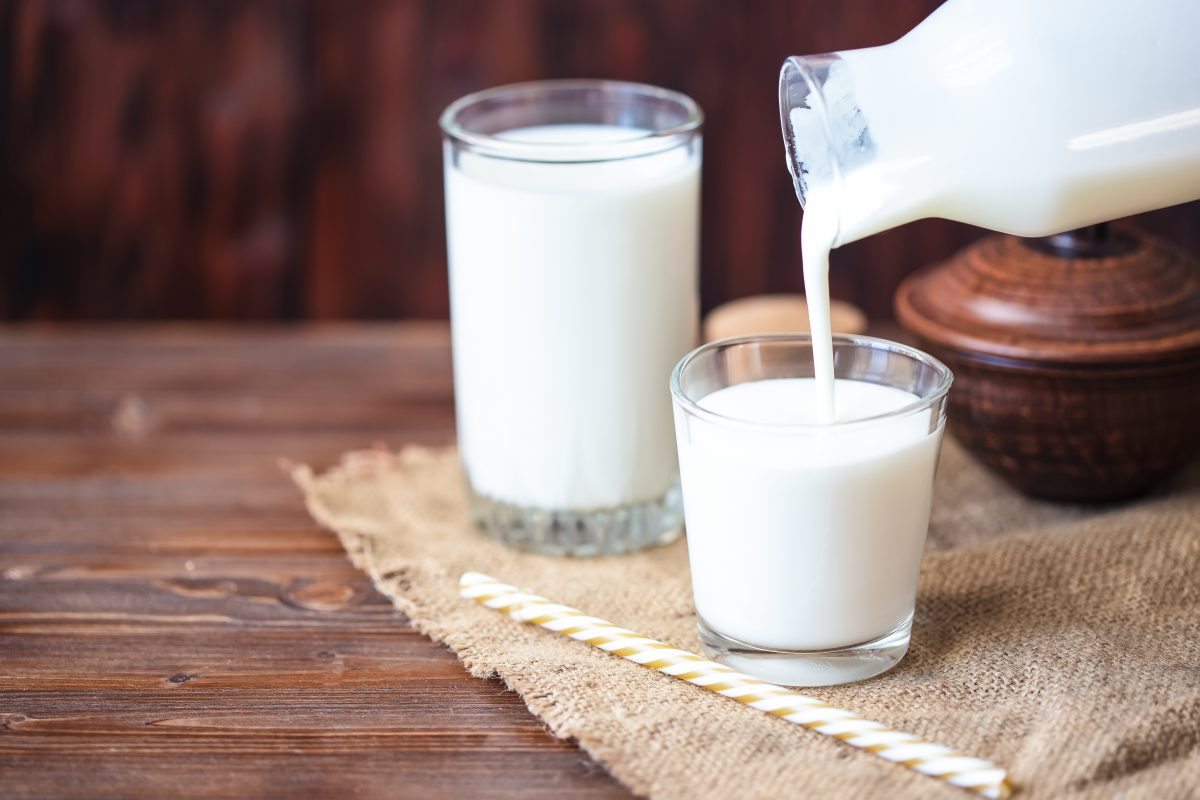Can you get lactose intolerance in pregnancy?
- Dietary Advice (non Low FODMAP)
Have you been googling ‘lactose intolerance in pregnancy,’ wondering if this is a thing?
Lactose intolerance occurs when someone does not have enough of the enzyme ‘lactase’ needed to break down the milk sugar lactose.
Lactose intolerance results in digestive symptoms after eating or drinking lactose-containing foods.
This article will go into whether the research on developing lactose intolerance during pregnancy is sufficient, some specific lactose intolerance in pregnancy symptoms, lactose-free recipes and other articles that can provide further information.

Does Pregnancy Cause Lactose Intolerance?
The research is limited but suggests that pregnancy does not cause lactose intolerance (1).
In fact, pregnancy may even improve lactose in those who have lactose intolerance (2).
The theory being that as the gut slows down in the later stages of pregnancy it provides the body more time to digest lactose before it hits the large bowel which would then cause symptoms.
Although lactose intolerance is not caused by pregnancy, other digestive problems are. Read ‘IBS and Pregnancy’ for further information.
Remember that you should always seek medical advice for digestive problems rather than self diagnosing.
What are the symptoms of Lactose Intolerance in pregnancy?
The symptoms of lactose intolerance are exactly the same as lactose intolerance in anyone. You can read our full guide here: ‘Lactose intolerance – What is it? How is it diagnosed? How do I manage it?.’
Symptoms include;
- Bloating
- Diarrhea
- Cramps
- Flatus (a build-up of gas within the digestive system)
- Borborygmi (rumbling or gurgling noise during digestion)
Getting enough calcium when you are lactose intolerant during pregnancy
Calcium is mostly found in foods which are high in lactose. Simply avoiding these foods without ensuring you are getting enough calcium from another source will lead to a deficiency for you and baby.
Calcium is especially important for bone health as well as muscle function. Calcium is also important to prevent preeclampsia and preterm births (3).
During pregnancy, a person is recommended to have 900mg to 1200mg of calcium per day (4).
Below is a table contain foods that are a good source of calcium and suitable for someone with a lactose intolerance (5):
| Food | Measurement | Calcium content (mg) |
| Lactose free cow’s milk | 1 cup | 229 |
| Hard cheese | 1.5 oz | 333 |
| Tofu (firm) | ½ Cup | 253 |
| Tofu (soft) | ½ Cup | 138 |
| Salmon (including bones) | 3 ounces | 181 |
| Spinach | ½ Cup | 130 |
| Kale (fresh cooked) | 1 Cup | 94 |
| Chia Seeds | 1 Tbsp | 76 |
Please note that it is quite difficult to meet the increased daily requirement of calcium during pregnancy, especially with a lactose intolerance. You may therefore need to consider a supplement to provide all or some of your intake.
Vitamin D is used to aid calcium absorption – a 10mg Vitamin D daily supplement is recommended for everyone including those who are pregnant (6).

How will lactose intolerance during pregnancy impact my baby?
Having lactose intolerance itself during pregnancy will not harm your baby.
However, during the growth of the baby within the womb, calcium is needed for their bone health, as well as the growth of tissue and other cells. So, having an inadequate calcium intake could impact your baby’s development.
Simply ensuring you have an adequate source of calcium each day will help to avoid these issues.
Summary
Lactose intolerance is where the body is unable to successfully digest lactose (a sugar found in dairy products).
Digestive symptoms are common in pregnancy but pregnancy does not cause lactose intolerance.
If you do have a lactose intolerance already then rest assured that this condition will not negatively impact your baby.
However, it is important to get adequate calcium in your diet or through a supplement to support your baby’s development.
When having lactose intolerance during pregnancy your calcium intake mustn’t reduce. The recommended range is 900mg to 1200mg of calcium per day.
10mg of vitamin D is also recommended, and vitamin D aids calcium absorption.
If you believe you have lactose intolerance it is important to speak to a healthcare professional before making and dietary changes.
Written by Kirsten Jackson Consultant Dietitian BSc Hons, RD, PG Cert